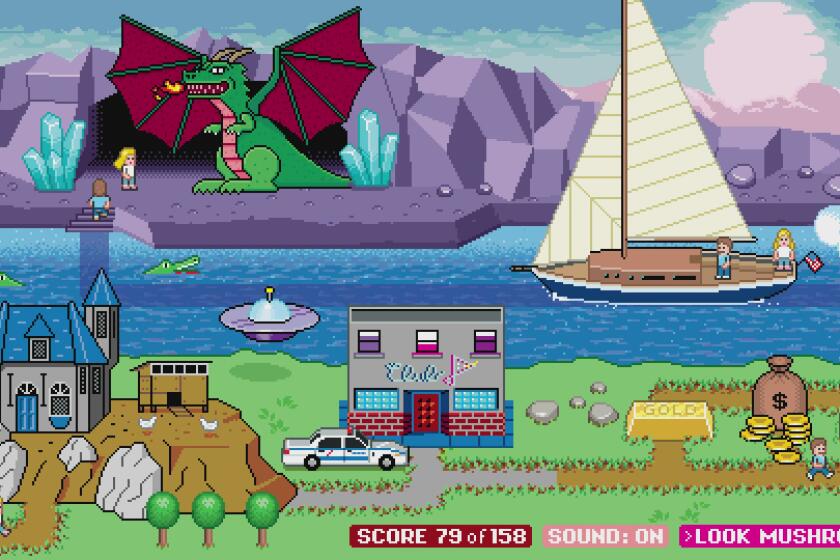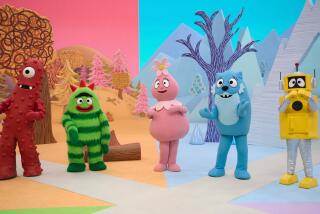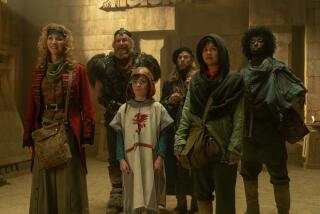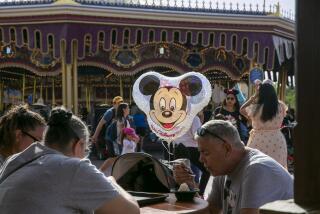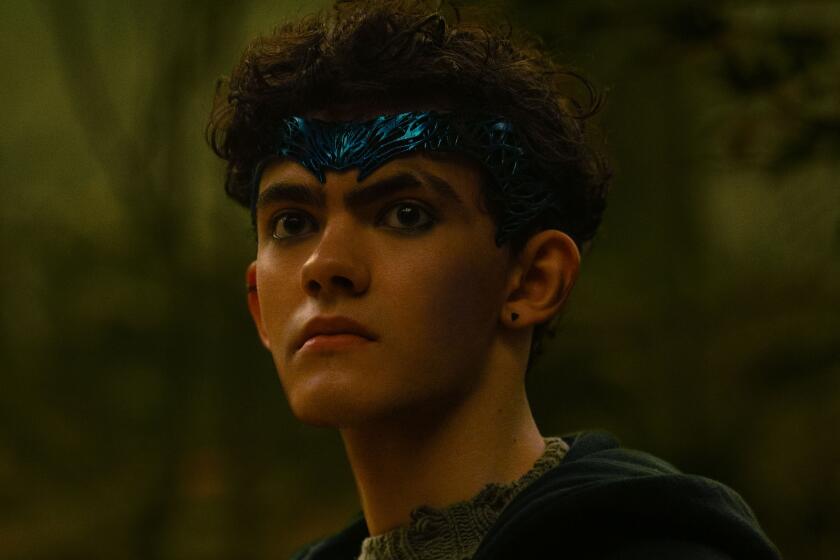‘Return to Monkey Island’ revives one of the most timeless of pirate franchises
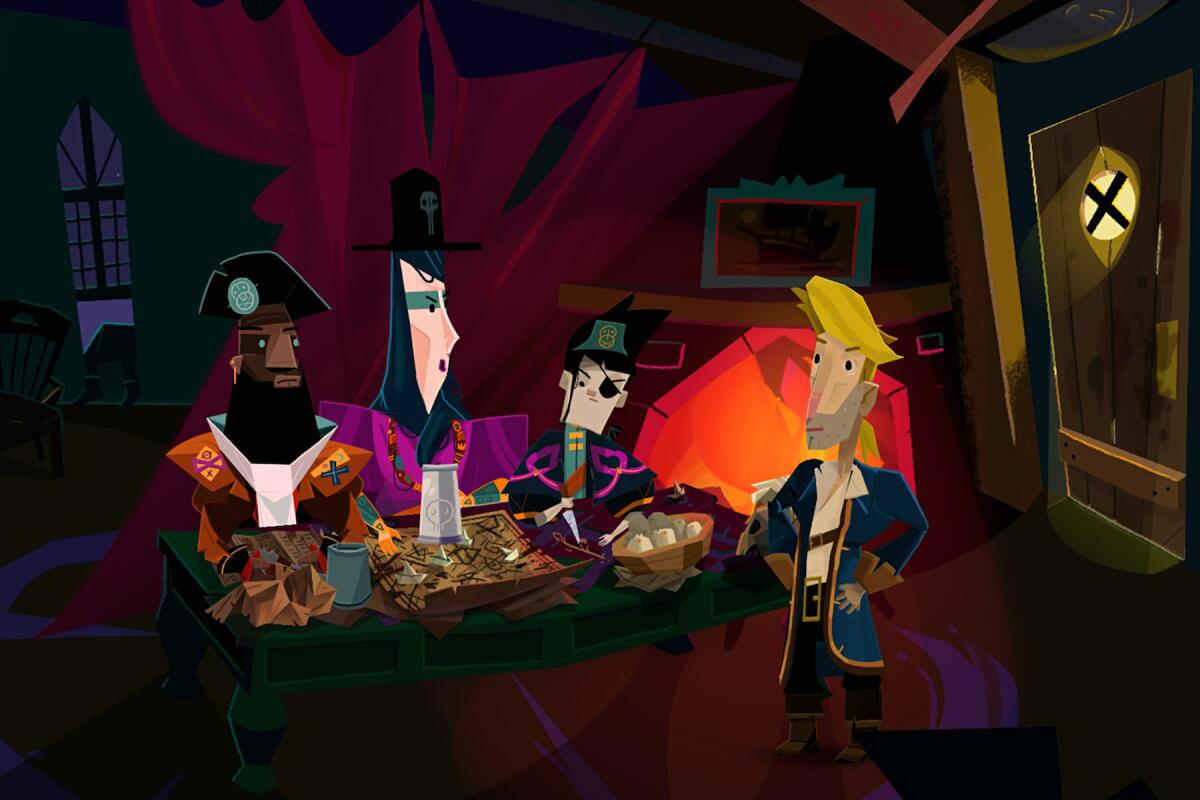
There’s an alternate, game-driven reality where the most famous pop-culture pirate of the 21st century isn’t Jack Sparrow but is instead Guybrush Threepwood.
Both are good-natured and bumbling, and both have had to battle supernatural foes. Neither is a stereotypical pirate, each has had decent luck in the romance department, and the two have shared an appreciation of comic timing. And both too are original creations influenced by Disneyland’s Pirates of the Caribbean.
But only one was just as handy with a rubber chicken as a sword.
Today, Sparrow and Threepwood are properties of the Walt Disney Co., but as the Johnny Depp-associated Sparrow lies dormant — aside from his robotic presence at Disney’s theme parks — in 2022, Threepwood has unexpectedly risen from intellectual property limbo. The “Monkey Island” franchise, with original creator Ron Gilbert at the helm, is resurrected this week with the release of “Return to Monkey Island” for PC and the Nintendo Switch.
“Return to Monkey Island” re-introduces players to characters from one of the most beloved and influential franchises ever made — the optimistic, would-be plunderer Threepwood, the revenge-seeking ghost pirate harasser LeChuck and the quick-witted swordmaster Elaine Marley, generally the only reliably intelligent one of the lot.
Gilbert envisioned the series for Lucasfilm’s then-game division LucasArts and oversaw the first two editions of the franchise in 1990 and 1991 before coming back for its sixth. The initial games pushed interactive storytelling, as they emphasized characters and placed their focus on puzzles based on their personality traits. Challenges were solved largely by having conversations and figuring out what people lacked, save for some brain-teasers that relied on wordplay.
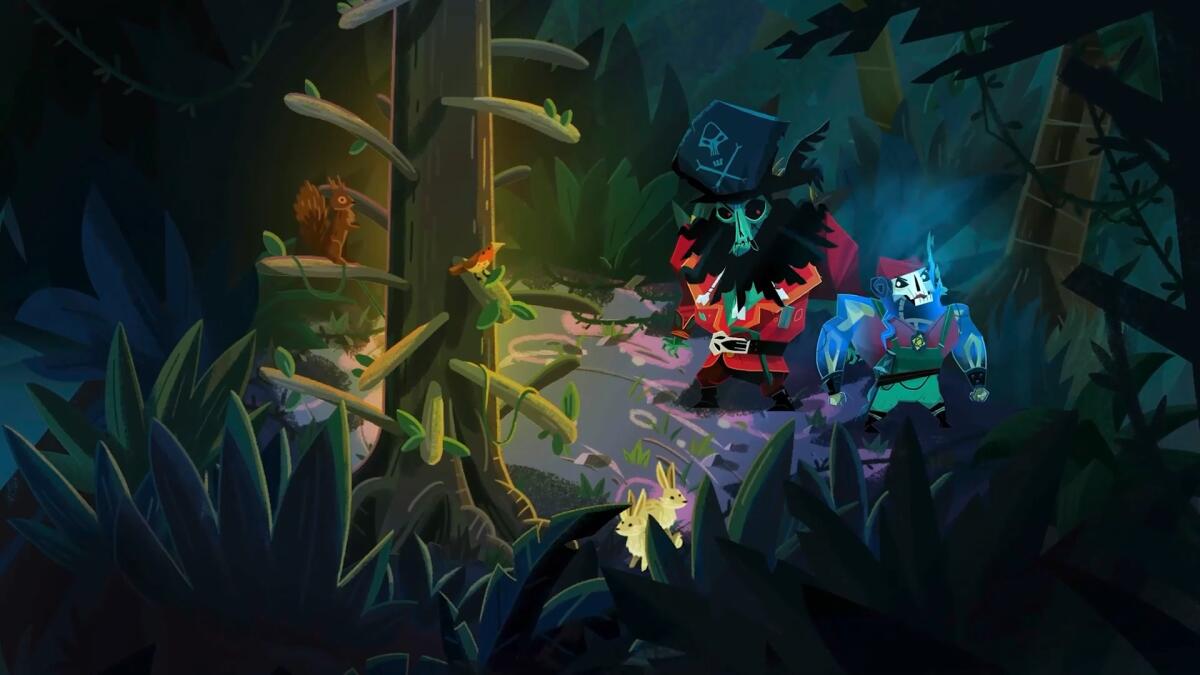
The “Monkey Island” games were some of the most fully realized interactive texts of their time, building upon the dense puzzles of Sierra On-Line games such as “King’s Quest” — as well as such LucasArts titles as “Maniac Mansion” and “Indiana Jones and the Last Crusade” that preceded them — by more dedicatedly emphasizing dialogue and twisting stories. There are talking skulls, mysterious voodoo, dangerous booze and swordfights that put the emphasis on insults slung over action — think lots of personal attacks with puns — and all of it results in one of the more colorful, absurdist pirate tales told in any medium.
“The beginning genesis of the game came from the fact that games like ‘King’s Quest’ were selling really well,” Gilbert says. “I fundamentally didn’t like fantasy. I really did not want to make a fantasy game. Pirates felt like a nice connection between those two things. It seemed like I could make a fantasy game without it being a fantasy game, and I read a book, ‘On Stranger Tides,’ and it was interesting because it was a pirate book but with a lot of voodoo magic. That’s when it clicked for me.”
After ending the second “Monkey Island” game with a cliffhanger — one that “The Return to Monkey Island” seeks to answer, essentially bypassing the narratives of all non-Gilbert-helmed “Monkey Island” games — Gilbert went on to start the kid-focused Humongous Entertainment, which he helped lead for about a decade. He says he essentially forgot about “Monkey Island.” Those weaned on games in the ’80s and ’90s, however, did not.
“‘It wasn’t until I created my blog,” Gilbert says, “and I realized all these people were coming to my blog with how much they loved ‘Monkey Island.’ That was a bit of a moment for me.”
Any modern video games that place an emphasis on story, be it the now Netflix-owned supernatural “Oxenfree” franchise or blockbusters such as Sony-owned titles “The Last of Us” or “God of War,” owe a debt to the finely drawn characters of “Monkey Island,” where every interactive head-scratcher was dedicating to building out a world. When one digs up a treasure early in “The Secret of Monkey Island,” it’s less a solution to the game’s first major puzzle than it is a story-building exercise that reveals that buccaneering has been partly co-opted into a capitalistic, tourism-focused enterprise.
After a 20-plus-year absence, Roberta and Ken Williams, the wife and husband behind the breakthrough video game ‘King’s Quest,’ make an unlikely comeback.
“We were working at the company that made ‘Star Wars’ and ‘Indiana Jones,” Gilbert says of LucasArts. “That makes you think about story and characters maybe more than we normally would have. I think of ‘Monkey Island’ as story first, puzzles second. It’s about the story and the characters. The puzzles are used to move the story forward.”
Released at the dawn of an era eventually dominated by first-person shooters, the first two “Monkey Island” games showed that play is best when accompanied by a robust narrative. “Really meaningful characters that you go back to that have backstories,” says Nigel Lowrie, co-founder of Devolver Digital, publisher of “Return to Monkey Island,” when asked about the importance of the franchise. “The first two games influenced a lot of game designers.”
Including those at Devolver, the idiosyncratic, Austin, Texas-based firm that has released games as wildly diverse as “Gris,” a thoughtful platforming-focused adventure that deals with grief and loss, and “Cult of Lamb,” a game that melds hacking and slashing with community building, all in the name of critiquing religion. Lowrie says Devolver had long had its eye on reviving “Monkey Island,” which has been inactive for more than a decade. While the Walt Disney Co. completed its acquisition of Lucasfilm in 2012, a Gilbert-directed “Monkey Island” seemed unlikely, as the creator had often said he had no interest in revisiting the franchise unless he owned the IP.
But in early 2020, just before the world would be upended by the COVID-19 pandemic, Gilbert was, to Devolver’s surprise, open to the idea. Gilbert was coming off the 2017 release of “Thimbleweed Park,” a “Twin Peaks”-inspired comedy game completed in a vintage pixel art style. While “Thimbleweed Park” excels in crafting contrasting characters and building narrative tension out of each puzzle, it remained only a critical and crowd-funding success. The game failed to break into the commercial mainstream.
“It obviously didn’t sell as much as my wildest dreams — millions of copies — but I was very happy with the critical acclaim and player feedback,” Gilbert says. Lowrie felt he had a strong relationship with Disney — the Walt Disney Co. declined to comment for this story — and he pitched Gilbert on the idea before securing the license. “I had a couple stipulations,” Gilbert says. “I wanted it to start right after ‘Monkey Island 2’ ended, and I wanted the freedom to make the game I wanted to make. So we started talking to Disney. Those negotiations took six to nine months.”
“I mean, I wanted to do a ‘Monkey Island’ in kind of the back of my head, but it was never a real thing that I thought would happen,” Gilbert adds. “I really didn’t want to do it unless I owned the IP, mostly because I wanted to make the game I wanted to make, but Devolver approached me a couple years ago because they knew someone in Disney licensing and wanted to know if I’d be interested in pursuing the license. I thought about it for a bit and called up Dave.”
The resulting game pairs Gilbert with one of the franchise’s original writers, Dave Grossman, and sees an older Threepwood out to solve a mystery while grappling with the passage of time. As unconventional a pirate as Threepwood may be, he’s framed here as something of an aging traditionalist, albeit one who still has an inept charm. The latter, says Grossman, is part of the lasting appeal of the “Monkey Island” games.
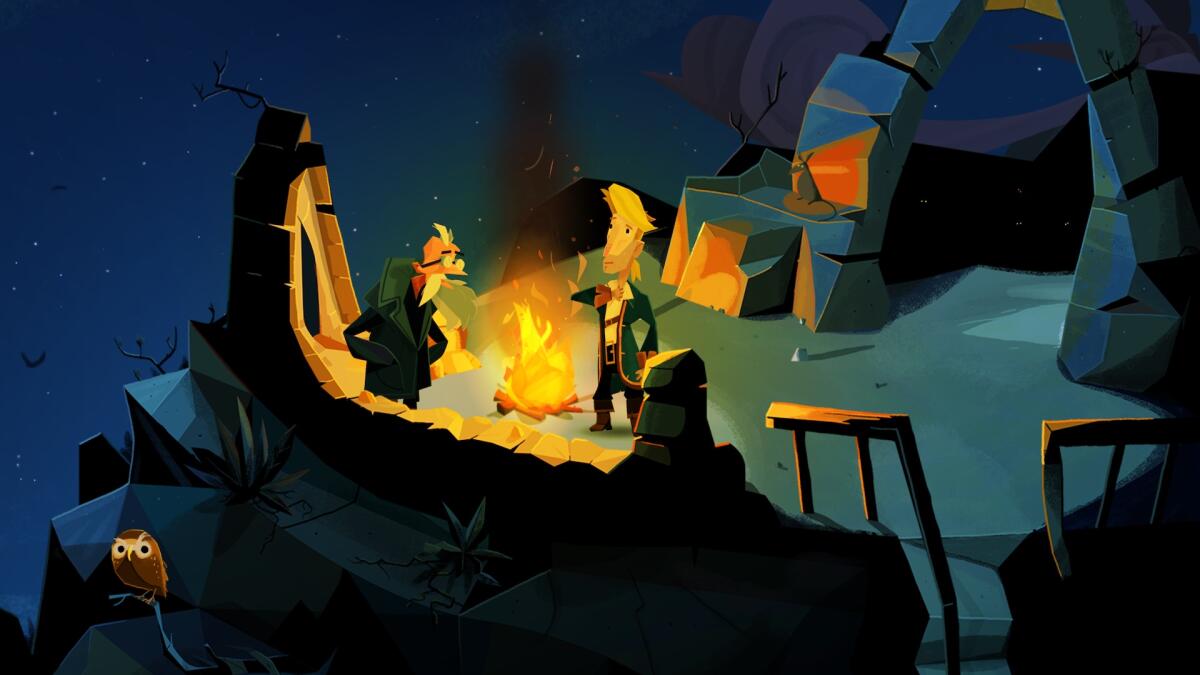
“There’s something to Guybrush where he’s sort of the best and the worst of all of us,” Grossman says. “He’s optimistic, and he has things he wants to do. He’s always excited about them — he’s gonna go out and solve problems and get things done. We like that. But he’s also kind of heedless of other people, and he leaves a trail of destruction in his wake. He’s sort of the bad boy without being the bad boy.”
While “Return to Monkey Island” is a sequel to a 31-year-old game, don’t think of it as a throwback. It slickens the adventure game format, letting players immediately know how and what objects on the screen can be interacted with. And it eschews retro art in favor of a style that looks constructed of paper, resulting in a world that feels full of movement. The look comes courtesy of art director Rex Crowle, best known for his work on indie game “Knights and Bikes.” Crowle got the “Monkey Island” gig thanks to a piece of fan art.
“Rex had sent me a piece of fan art 10 or 15 years ago,” Gilbert says. “It was always one of my favorite renditions of Guybrush because it was different and provocative. So when this game came up, and we decided we weren’t going to do pixel art, I found that picture and Googled who had done it.”
But aside from some modern flourishes and a revamped look, the overall tone — one built on mystery and humor — is still there. And today, with the game a collaboration among Gilbert’s Terrible Toybox, Devolver Digital and the now Disney-owned Lucasfilm Games, “Monkey Island” is in a way coming home.
“I used to go to do Disneyland quite a bit,” says the Seattle-based Gilbert, “because my grandparents lived down in L.A. I just loved Pirates of the Caribbean. When we first started making ‘Monkey Island,’ one thing I told Mark Ferrari, who was the artist at the time, was that I wanted it to feel like the ride, especially the beginning. It starts out as the Louisiana bayou and everything is blue and misty. I wanted the game to feel like that. I wanted a game that felt like you were on Pirates of the Caribbean, and you could stop and get off and play around.”
In other words, Gilbert wanted a game that felt timeless. And as “Monkey Island” settles into its third decade, it’s proving to be just that.
'Return to Monkey Island'
More to Read
The biggest entertainment stories
Get our big stories about Hollywood, film, television, music, arts, culture and more right in your inbox as soon as they publish.
You may occasionally receive promotional content from the Los Angeles Times.
